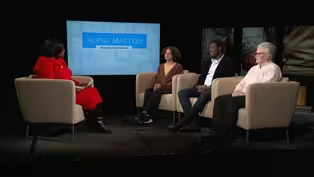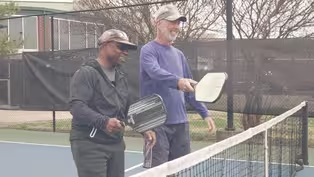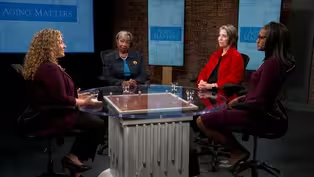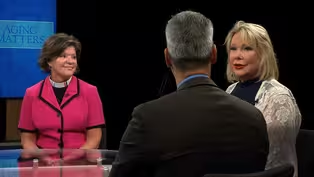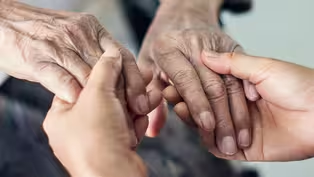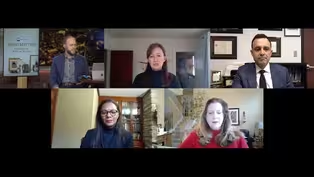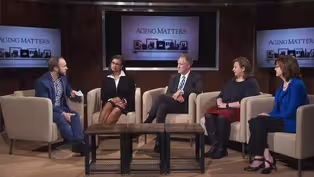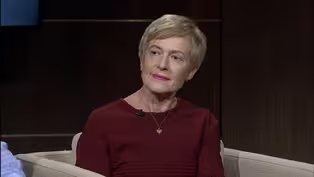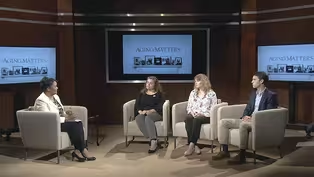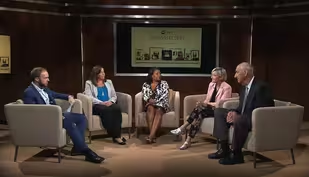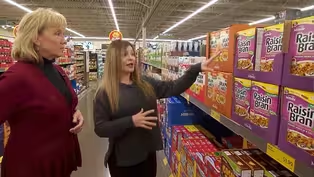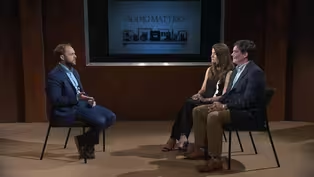
Affordable Housing in Nashville
Special | 26m 46sVideo has Closed Captions
As the cost of housing surges in Nashville, we pause to consider a more affordable future.
Nashville has seen incredible growth in recent years, both in population and prosperity. And while a booming job market has been good for the economy, it’s also applied substantial pressure to the city’s dwindling supply of affordable housing. Without access to housing that even Metro’s lowest-income individuals can afford, the prospect of increased homelessness becomes inevitable.
Problems playing video? | Closed Captioning Feedback
Problems playing video? | Closed Captioning Feedback
Aging Matters is a local public television program presented by WNPT

Affordable Housing in Nashville
Special | 26m 46sVideo has Closed Captions
Nashville has seen incredible growth in recent years, both in population and prosperity. And while a booming job market has been good for the economy, it’s also applied substantial pressure to the city’s dwindling supply of affordable housing. Without access to housing that even Metro’s lowest-income individuals can afford, the prospect of increased homelessness becomes inevitable.
Problems playing video? | Closed Captioning Feedback
How to Watch Aging Matters
Aging Matters is available to stream on pbs.org and the free PBS App, available on iPhone, Apple TV, Android TV, Android smartphones, Amazon Fire TV, Amazon Fire Tablet, Roku, Samsung Smart TV, and Vizio.
Providing Support for PBS.org
Learn Moreabout PBS online sponsorshipMore from This Collection
Learn more about the issues facing an aging population from a panel of experts and community members discussing various topics on aging for Nashville Public Television original series NPT Reports: Aging Matters.
Raised by Grandparents Panel Discussion
Video has Closed Captions
Individuals discuss both the challenges and the benefits of being raised by grandparents. (25m 8s)
Video has Closed Captions
A discussion about making the most of our time and abilities as we age. (26m 46s)
Video has Closed Captions
Experts discuss what has to change to give older women the quality of life they deserve. (26m 46s)
LGBTQIA+ Resources in Middle Tennessee
Video has Closed Captions
A discussion of health and social services available for older Middle TN LGBTQIA+ adults. (26m 46s)
Long-Term Care: Know Your Options
Video has Closed Captions
A conversation exploring long-term care options in Tennessee and their affordability. (26m 46s)
Video has Closed Captions
Experts discuss how older adults can stay safer-at-home during the COVID-19 pandemic. (27m 9s)
Legal Help Panel Discussion | Aging Matters | NPT Reports
Video has Closed Captions
NPT’s Aging Matters: Legal Help sheds light on resources for legal assistance. (27m 24s)
Hospitals & Health Risks Panel Discussion | Aging Matters
Video has Closed Captions
A panel of experts discusses strategies for a safe hospital stay. (28m 39s)
Loneliness & Isolation Panel Discussion | Aging Matters
Video has Closed Captions
Brent Elrod, Gretchen Funk and Andrea Prince discuss issues of loneliness and isolation. (28m 32s)
Dental Health Panel Discussion | Aging Matters
Video has Closed Captions
Experts discuss SMILE ON 60+, an initiative aiming to improve oral health in older adults. (27m 16s)
Video has Closed Captions
Aging Matters: Practical Nutrition offers simple tips and advice. (28m 31s)
Aging & the Workplace Panel Discussion | Aging Matters | NPT
Video has Closed Captions
Aging & the Workplace Panel Discussion (32m 59s)
Providing Support for PBS.org
Learn Moreabout PBS online sponsorship- Nashville has seen incredible growth in recent years, both in population and prosperity.
And, while a booming job market has been good for the economy, it's also applied substantial pressure to the city's dwindling supply of affordable housing.
Without access to housing that even metro's lowest income individuals can afford, the prospect of increased homelessness becomes inevitable.
But, there are folks leading the fight for affordable housing in Music City, several of whom are joining us to talk about it.
Danielle Cotton is the co-founder of AWAKE Nashville, a nonprofit advocating for older adults.
Jamie Berry is chief of staff for MDHA, Nashville's Housing Authority, and Eddie Latimer is the CEO of Affordable Housing Resources, a nonprofit affordable housing developer.
Well, thanks for joining us.
Eddie.
- Thank you.
- Would you help us kick off this conversation by defining affordable housing?
- (scoffs) Yes, affordable means that you can live in it and still have funds left over to pay for food, to pay for utilities, and maybe go to a movie periodically, but it, so that's, it's really relevant to each income group.
So, if you were to break the incomes out to $10,000 by $10,000, basically those make it under $30,000, really struggle.
They pretty much cannot afford rent or mortgage.
Those make it up to about $60,000 can afford rent, but they can only afford 30% of their income towards rent.
- All right, okay.
Well, Jamie, if a person does qualify for affordable housing, what's the application process, and what's MDHA's role in this?
- So, we provide an online application, and we open waiting lists on a periodic basis.
After COVID, we started opening waiting lists on a monthly basis, and we just paused that for a few months to kind of make sure that we're doing everything, what we should be doing.
You know, "are we helping people the way that we should?"
"Is this the right process," kind of thing.
And, we're gonna start reopening later this year.
But, really, if they need affordable housing, they can apply online, and we offer help.
If they need assistance, they can call the office, and we will fill out the application for them.
And, we do that often.
We also tell them that if they need access to a computer, they can go to the library.
And then, what we do, we send out the information to a lot of different partners, and those partners will also help people fill out the application.
Metro Social Service does a great job actually helping people fill out the application.
I have a great story, if I have just a minute.
Myself and Paul, at Metro Social Services, were helping this woman that we had talked to on the phone multiple times, who was, you know, basically getting evicted and she was actually in the hospital, and we couldn't get ahold of her.
But, because we had worked with Paul, Paul had all of her information, and could actually apply online for her while she was in the hospital.
She didn't even know we had applied for her.
And so, she's actually living in our housing now.
- Okay, that's great.
That's good to know.
Now, Danielle, your family has some personal experience in the affordable housing market.
Just a year ago, your grandmother, and, what?
20+ seniors in her senior community were evicted, and didn't have very much notice.
- Right.
Can you tell me a little bit about that experience, and what it was like looking for affordable housing on short notice?
- Yeah, so last year, as you said, my grandmother was displaced from her senior living community in Madison, Tennessee.
And, they had less than 60 days to find somewhere to relocate.
And, as can imagine, it was devastating for this community to be uprooted from a place that they have nurtured, and called home, for many, many years.
And, as someone in my thirties, I can't imagine having to pick up my life, and find somewhere to move within that short timeframe.
But, as a senior, to have to pick up your life with very few resources, fixed income, limited access to technology, to even begin to apply for applications online, or begin the search for finding affordable housing options, it was extremely difficult for this community to navigate.
So, my mother and I really became, like, on the ground social workers to provide support and help mobilize this community through this process.
- Were you able to find an affordable apartment in Nashville?
- Not for my grandmother.
For some, we were able to house them in other areas of Nashville, not necessarily Madison any longer.
But, for my grandmother, the only place that we could find her was a one bedroom apartment in Smyrna, Tennessee, that was not a senior living community.
It was 40 minutes away from her original home, where she was brought up.
And, it was really a rippling effect that was felt amongst my entire family, because not only did she support us, and depend on us, but we also depended on her.
And so, it was a rippling effect that was felt amongst my entire family, and it was extremely hard to move her 40 minutes away.
- If you don't mind me asking, how's your grandmother doing today?
- She's doing well.
She is no longer in Smyrna, because we are a close knit family, and we needed her to be close.
And, she's also experiencing some health complications from that move and other things.
And so, my aunt was very fortunate to be able to add onto her home to build my grandmother an apartment onto her home.
But, it was a complicated process.
It was not easy, but I'm glad to have her back.
And, she's doing well, she's back in Nashville, and we we're just very fortunate to have her back.
- Well, that touches on something we may get to later, which is zoning issues.
- [Danielle] Yes.
- But I want to, before we do that, go to a video that we have queued up here.
Now, recently I was able to go to San Francisco, and interview a national expert on affordable housing and homelessness specifically.
San Francisco, as you may know, is a city that has a real shortage of affordable housing and a real problem with homelessness.
And, just for comparison's sake, San Francisco is a city of about 800,000 people and they have over 7,000 people on the streets.
Nashville, on the other hand, is a city of 650,000 roughly.
And, according to last count, we have about 2000 people experiencing homelessness in Nashville, all right?
But, there may not be as much light between those numbers, as you'd like to think.
So, let's go ahead and see what Dr. Kushel in this video has to say.
(heeled footsteps on tile) - The reason that I spend all of my days working on housing and homelessness, even though I spent so many years training to be a physician, is that I realize that there is no medicine as powerful as housing.
(keyboard keys click) - [Reporter] Dr. Margot Kushel is a professor of medicine at the University of California, San Francisco.
That's where she directs the Benioff Homelessness and Housing Initiative.
- People have this idea that people experiencing homelessness are rushing into whatever city they're talking about.
People in Nashville are convinced that people are coming from other places.
People in San Francisco are convinced, it's not true.
In general, people become homeless near where they live, when they're homeless.
But, the opposite is true.
Lots of non-homeless people have rushed over the last decade or two, into San Francisco.
We are the heart of Silicon Valley.
We are where people wanted to be.
We're a really common destination, like Nashville is.
I see a lot of similarities between Nashville and San Francisco in that way, of places that are interesting, exciting, there's a great economy for well-educated people, lots of new jobs.
In San Francisco.
We did not keep up with the housing.
there was one statistic that showed in a decade period, before the pandemic, for every 10 new jobs we created, we created barely one unit of housing.
What do you do when you bring a lot more people into a region, and you don't create any housing for them?
You drive up housing costs.
Housing costs went way up, and everyone was kind of pushed down in the housing market until somebody just gets pushed out to the street.
San Francisco should be a cautionary tale for any other thriving city.
It's great to have great jobs, it's great to have people wanna live there, that's terrific.
But, you need to create the housing for everybody.
Seniors who've spent their entire life since San Francisco and Nashville shouldn't be forced out.
You need to be sure that you are creating the housing not only for all the educated workers who need to come in, you also need to create and sustain the housing for the full spectrum of people.
- Okay.
So we had a chance to look at that video, to hear from Dr. Kushel.
Initial reactions?
Any thoughts?
- Yeah, it's a harsh, harsh reality that we are in the thriving IT city, but we're not producing enough affordable housing to make sure that the pillars of our community, and seniors, are being able to thrive from that growth.
And, we really need to start having more conversations like this to discuss innovative solutions, and how we're gonna address this growing problem.
- And, there are a lot of people I know that will not go to a conference in San Francisco, because of that 7,000 number.
And, you know, if it comes here, you know, we're growing, it's the population unfortunately is growing, it will really impact Nashville's overall economy.
So, it really is negative and counterproductive for Nashville to ignore that homeless population, because eventually it's going to start impacting our economy.
- Yeah.
Now, I did find one difference between San Francisco and Nashville interesting, doing my own research.
Nashville has a lot of land.
We have 500 square miles of land, approximately.
That's 10 times more than San Francisco, okay?
So, Jamie, how is MDHA making use of land?
Is there enough, and what are we doing with it?
- I can share a great example of what I felt like we did right.
You know, we had this piece of property on Rosa Parks Boulevard that was adjacent to our Cheatem Place property.
And, it was serving as a maintenance facility and our training center.
And, but it was on this prime piece of real estate with transportation opportunities, next door to a Kroger walking distance from the farmer's market, bicentennial mall, many restaurants.
And, really, when we sat down at the table, we just, we knew that we could be better stewards with that piece of land.
And so, we tore down that training facility, which had staff located in it.
We used that training facility probably three days a week.
And then, the maintenance facility, of course, was used all day.
But, again, we just wanted to better serve our mission.
So, we tore it down, we built a hundred units, 50 were new, affordable, subsidized units in Nashville, and then 25 workforce, 25 market rate.
So, I think that's a good example of what we're doing with our land.
Now, as you know, MDHA has many properties throughout the city, we have a lot of land.
Another example would be what we're doing at Casey, the Casey transformation.
We are increasing density there.
So, when we started Casey, there were 716 units that were built in the forties and the fifties, air conditioned units hanging outta the windows.
If you go there today, about half of those are left, because we're building in phases.
But, we also have 500+ new units.
And, we've done several developments, six or seven, and we have 200 more under construction.
And, in a few weeks we'll have another 200 more, so a total of 400 units under construction.
But, we're increasing that density.
We're going from 700+ units, to more than 2300 units.
And, the goal is to not only increase the number of affordable housing, but also bring in workforce and market rate.
- Great.
Eddie, how do you think zoning changes could make better use of the land that we have?
- Well that would really radically change everything.
Like, right now you've gotta fight really, really hard to get two homes on a lot.
And, a lot could hold four.
I mean, they're doing this very successfully in Boise, where they get little corner lots and they can put six homes in there.
They call 'em little pocket neighborhoods.
There's a lot you can do, but you've, but the problem is, is so much of our zoning has been controlled by the developers, and not necessarily all developers, but a lot of it's been controlled by fear.
And, this housing is partially a spiritual issue.
I mean, do you care about your neighbor?
I mean, that's really a basic foundational block.
And, I bet the three of us have some sense of calling to do this to care for people.
So, but it, a lot of it has been that nimby stuff, and that's what blocks us from being able to use our city the way that I think even city officials want it to be used, is we've gotta find a way or a system, maybe tweak the system, so that you can get density without so much bloodshed.
- All right, while we're on the subject of land, Danielle, I wanna turn to you.
Your organization, AWAKE Nashville, is going to be break breaking ground on a new development in 2024.
Briefly tell us about that.
- Yeah, sure.
So, we recently received Barnes funding to start building our new community.
And, we are really, really excited.
The community will be housed in North Nashville.
And, North Nashville is very dear to my heart because it's where I grew up.
And so, I'm very excited to be building a new community for seniors, affordable, independent senior community, in the, the environment that I grew up in.
And so, this new community will have a very innovative design concept to provide individual style, cottage style homes, to seniors on fixed incomes.
And, we're gonna have supportive services, a communal space where seniors can commune and gather.
And so, this community will really be a place where seniors can comfortably age in community.
- That's great.
Now, either you or Eddie can take this, depending on who wants to, but what is the Barnes Fund?
Some of our audience may not even be familiar with that particular funding mechanism.
- So, the Barnes Fund makes competitive grants available to nonprofits and nonprofit developers, to increase the housing stock of affordable housing in the metro Nashville area.
So, essentially that is what Barnes funding does.
Okay, did you have anything to add to that?
- Well, I just would point this out, as it's named after a preacher who was really named Bill Barnes, who was one of the first churches in the city to integrate.
And, it was very difficult for him, but he believed in people, and he saw the soul.
And, housing became a big issue to him, because especially around homeless, that he saw the workforce was really, a lot of members of his congregation couldn't find housing.
And, that's what probably most of your housing non-profits are focused on the workforce, which are those making like $20 an hour and up, 30.
This is really interesting, but anyway, but the Barnes Fund has been one of the great tools that our council and our city has given us for creating housing, in the sense that they give us part of the money we need so that we can reduce the permanent debt.
That's essentially the best way to put it.
So, if you got a $200,000 project, and they give you $40,000 then you only have to finance $160,000, so it makes it affordable.
- Right, so the Barnes Fund is clearly a valuable tool - [Eddie] Yes.
- For creating more affordable housing, but it's not the only one at our disposal.
Jamie, talk to me a little bit about the PILOT program.
- What's great about the Payment in Lieu of Taxes, is that we offer that to developments that have a qualified, and are getting a low income housing tax credit from our sister partner at the state, THDA, Tennessee Housing Development Agency.
And, what this is, is these are developers that really want to build affordable housing, because we all know at this table, it costs as much to build an affordable unit, as it does to build a market rate unit.
And, it's expensive to build.
And, so, you know, we wanna incentivize those developers who are interested in building in Nashville, to actually build affordable housing.
And so, it's a tax abatement, and so, it relieves them of taxes for, I think it's 10 years and, you know, makes that affordable housing development viable for them, it makes it doable financially.
- Right.
Eddie, you served on the 2021 Affordable Housing Task Force.
Now, in that report they identified a handful of tools, both Barnes Fund and Payment in Lieu of Taxes were included.
What are some of the other tools that you think are really important, but are maybe overlooked?
- Well, one of the best tools we had for about a decade was a state tool out of the Department of Revenue, called the Community Investment Tax Credit.
And, at that rate, we could borrow money from banks for almost nothing, because if you, if the bank loaned us the money only for affordable housing, they would not charge us interest if the rate, the national rate was under 4%.
So, it allowed us to build a lot of homes, get it out there, get it stabilized.
The reason there's 10 years on that is after 10 years it's stable, and you can probably raise rents to make up for the taxes.
It'll be suddenly show up.
So, but it's been a great tool, but because of the way that the money has increased in its cost, it's not a viable tool anymore.
And so we, I think one bank made a CITC loan, but that's it.
Another tool that we do get money, there are a couple of us that get money out of the treasury, through new market tax credits, but primarily through the Community Development Financial Institution.
Most of that money right now is going to rental.
We use it for home ownership, we do down payments so that we can serve more people, but I don't know of many programs outside of those that we have in Davidson County.
The two run by the city, and two run by the state.
- Jamie?
- Well, I was just gonna say, so the developers who have received low income housing tax credits and PILOTs, that's actually created, or preserved, more than 8,000 units since 2016.
And so, when you think 8,000 units, you think, "wow, that is a lot of units," but we need so much more.
And, what it's really gonna take is partners coming together, city, us, developers, everybody coming together and really making this happen.
Because, again, you think 8,000 units, but that's just a drop in the bucket really.
- Right, right.
If I could say this, I think the only way we're gonna accomplish this is get the for-profits to the table.
I mean, there are 10 non-profit developers who just do development 24/7, and they've come together in a thing called the Alliance for an Affordable Nashville.
And, but we can't do it.
You have to get the for-profits.
The for-profits right now don't have incentives or subsidies to help 'em buy down the, it's all about buying down the permanent financing, to buy down the permanent financing.
But, we have to do that.
We have to find ways to incentivize them, and they have to find ways to let go of a 30, 40% profit, Reduce it, you know?
We want you to make money, but you just need to reduce it.
- Right.
Well, we're reaching sort of a natural conclusion to our conversation here, but we have a couple minutes left.
Danielle, I wanted to come back to you, you and your organization, AWAKE Nashville, our relative newcomers to the affordable housing, you know, discussion.
So, in your short time doing this, what have you learned, and what would you like to, sort, of pass on?
- Partnerships and collaborations are essential to get this work done.
We wouldn't have gotten this far if we didn't have strong partnerships and collaboration.
So, it's going to take community leaders, government leaders, nonprofits, developers, all of us collectively coming together to address this problem.
Because, if we don't, we're gonna have a much bigger problem on our hands.
And so, we gotta start coming together.
- Absolutely.
Eddie?
As I mentioned, you were on the Affordable Housing Task Force.
They had some goals, you know?
They wanted to create 52,000 new housing units by 2030.
What kind of progress are we making?
Are we on our way toward meeting that goal?
- Well, on the Barnes Fund side, the construction side, the positive side, what MDHA is doing, increasing, taking their land and doubling the units on it, all that's coming along real well.
But the problem is, is that we're losing more housing than we're gaining.
And, this is a much bigger problem.
But, most of our mom and pop landlords have been take bought out by corporations and other investors.
So, the properties that used to rent to people for 600 to $800 a month, are now charging $1,300 a month.
Because they're owned by corporations, and corporations have one mission, which is to make money for the investors.
And so, you lose the mom and pop element, which is, "I'm also a part of a community.
I don't want the community not to suffer for me."
- Jamie, you get to wrap things up.
I have a couple questions for you.
The first one is, what happens if we don't solve this affordable housing crisis and we continue to experience the kind of growth that we are today?
- Well, I think the inevitable happens.
We're gonna have more people living on the streets.
We're gonna have prices going up, and people not being able to stay in their homes, which is really scary.
- And lastly, what is MDHA committed to doing to make sure that we have the affordable housing we need going forward?
- Well, let me just preface by saying what I think we've all said at this table, which is we can't do it alone, right?
It's gonna take many partners, and Eddie's absolutely right.
We gotta get more for-profit leaders to the table.
I think back on a veteran's experience in homelessness property that we did, where we created 40 units.
And, that was a for-profit developer, that was Operations Standing On Tennessee, offering services on site, that was US, and THDA.
And it was just everybody coming at the table, and even a gifting kind from someone in town.
And so, but again, that is just one example in 40 units.
So, we've gotta get everybody to the table and everybody to support it.
But, we are absolutely gonna move forward with what we are continuing to do, which is Casey, and building units, Super excited to have those 400+ units under construction in a few weeks.
I can't, I think the last time we did that was in 1970, we had more than 400 units under construction, so that's exciting for us.
- Well, I just wanna thank each of you for joining us on Nashville Public Television.
It's been a pleasure talking with you, and it's been informative.
As I wrap up this conversation, I'd like to thank you for tuning in.
You can watch More "Aging Matters" content at wnpt.org/agingmatters.
(joyful floaty electronic music) - [Spokesperson] Major funding for "Aging Matters" is provided by the West End Home Foundation, enriching the lives of older adults through grant making, advocacy, and community collaboration, The Jeanette Travis Foundation, dedicated to improving the health and wellbeing of the Middle Tennessee community, the HCA Healthcare Foundation, on behalf of Tristar Health.
Additional funding provided by Jackson National Life Insurance Company, the Community Foundation of Middle Tennessee, and by members of NPT.
Thank you.
(upbeat rhythmic strumming)

- News and Public Affairs

Top journalists deliver compelling original analysis of the hour's headlines.

- News and Public Affairs

FRONTLINE is investigative journalism that questions, explains and changes our world.












Support for PBS provided by:
Aging Matters is a local public television program presented by WNPT
